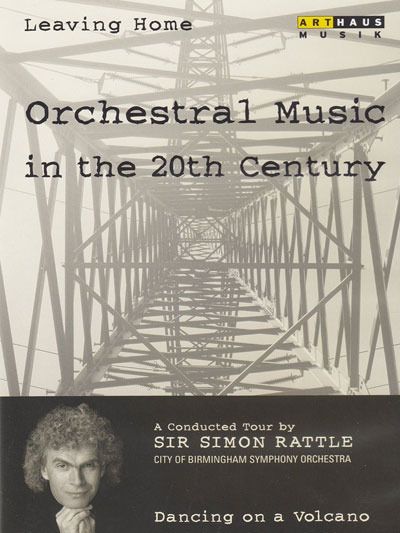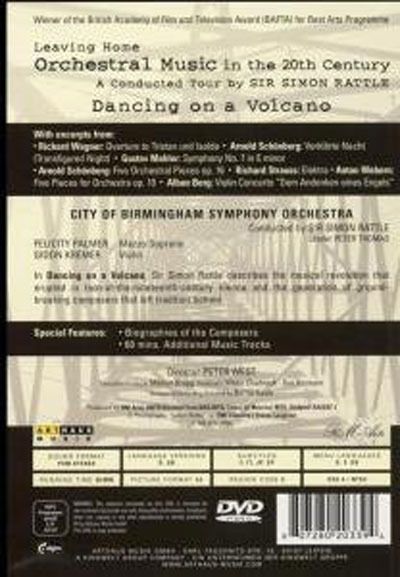21:39
Leaving Home: Orchestral Music in the 20th Century, Vol. 1 - Dancing on a Volcano [DVD]
Posted by kwakee
Leaving Home: Orchestral Music in the 20th Century, Vol. 1 - Dancing on a Volcano [DVD]
Conductor: Simon Rattle | Composer(s): Richard Wagner, Arnold Schoenberg, Gustav Mahler, Richard Strauss | Performer(s): Felicity Palmer, Gidon Kremer | Orchestra/Ensemble: City of Birmingham Symphony Orchestra | Label: Arthaus Musik | DVD | Picture format: 16:9 | Sound format: PCM Stereo / DTS 5.1 | File host: Share-online.biz | 5% recovery record + 1 .rev file | Run time: 50 Mins. | 5.09 GB
Language(s): German, English | Subtitle(s): Italian, French, Japanese, Spanish
Conductor: Simon Rattle | Composer(s): Richard Wagner, Arnold Schoenberg, Gustav Mahler, Richard Strauss | Performer(s): Felicity Palmer, Gidon Kremer | Orchestra/Ensemble: City of Birmingham Symphony Orchestra | Label: Arthaus Musik | DVD | Picture format: 16:9 | Sound format: PCM Stereo / DTS 5.1 | File host: Share-online.biz | 5% recovery record + 1 .rev file | Run time: 50 Mins. | 5.09 GB
Language(s): German, English | Subtitle(s): Italian, French, Japanese, Spanish

Written and presented by Sir Simon Rattle, this series forms a fascinating intro to, and overview of, the music of the twentieth century. Each program is illustrated with evocative imagery, archive film, and photographes, and the featured music is set within the broader context of artistic and social chenge. This first episode describes a great musical culture in decline in turn-of-the-century Veinna. From that decline erupted a musical revolution whose reverberations have continued to this day. Featured are the workds of Schoenberg, Webern, and Berg.
Watch a Trailer (sample is a lower resolution than actual DVD or Blu-ray):
REVIEW:
Kevin Sutton, MusicWeb International
Appearing for the first time on DVD, this is the first disc in a series of seven programs that Sir Simon Rattle made for television in the 1990s. Leaving Home is an historical journey through the radical changes in music that coincided with the tremendous social, technological and political upheaval that was the twentieth century. Artfully scripted, and with excellent musical examples, these fifty-minute programs integrate history (by means of some nicely chosen archival film footage), lecture (with Sir Simon speaking and illustrating from the keyboard) and performance, (with Sir Simon on the podium.)
We begin with a summary of the end of the Hapsburg Empire at the turn of the century and with the infamous Tristan Chord of Richard Wagner, that notorious little diminished chord that resolves in all the wrong ways and thus changed harmonic progression forever after. From Wagner we move on to Arnold Schönberg, who with his string sextet cum string orchestra masterpiece Verklärte Nacht, Sir Simon illustrates just how far a composer can push the limits of tonality without destroying it altogether.
The next topic is the dis-ease of early twentieth century Europe. Maestro Rattle shows how nocturnal images transform from portraits of repose to symbols of fear and unrest through an example from Mahler’s Seventh Symphony. The final and most prevalent topic of the program is the attempt by Schönberg and his students Alban Berg and Anton Webern to move beyond tonality. It was Schönberg’s belief that tonal composition had reached its apex in Wagner, and that there was no logical path but to leave such music in museums and replace it with an egalitarian twelve-tone system of composition in which all twelve notes of the chromatic scale were equal, and in which no note could be repeated until all of the notes had been used in their proper succession.
We arrive at Schönberg’s solution through a quick stop at one of Richard Strauss’s unique works, the tonally ambiguous and slightly maddening Elektra, a work in which Strauss pushed the limits of both tonality and emotional display; a method and tactic to which, once out of his system, he would never return.
There is much to be learned from this informative program, which for today’s lightning-fast society is exactly the right length. If anything, Sir Simon’s voice and delivery are a bit too soothing, and interesting as the material is, I found myself nodding from time to time while I watched. It will be of great interest to see how he handles the basic failure of the Second Viennese School’s music to take root anywhere except in academia. Admit it, there are still a handful of twelve-tone pieces in the repertoire, but it is such a limited system that it ran out of usefulness long before many college professors figured out that no one was listening anymore.
In spite of the high quality of the program itself, there are some production values that are sadly missing. First off, the failure to identify the two audio-only bonus tracks as anything other than being "Naxos recordings" is inexcusable. I had to do a little extra legwork on the Naxos website to figure out who was playing. (Both performances are quite fine by the way.) And, whereas the composer biographies are nice, they are simply scans of typewritten pages, so small in print that to read them one needs to stand directly in front of one’s television. Hardly comfortable or of much use really. Program notes are concise and of interest.
These are small caveats, and things that can be easily remedied with a bit of care. Recommended highly.
Works on This Recording
1.
Tristan und Isolde: Act 1 Prelude by Richard Wagner
Conductor: Simon Rattle
Orchestra/Ensemble: City of Birmingham Symphony Orchestra
Period: Romantic
Written: 1858; Germany
2.
Verklärte Nacht for String Orchestra, Op. 4 by Arnold Schoenberg
Conductor: Simon Rattle
Orchestra/Ensemble: City of Birmingham Symphony Orchestra
Period: 20th Century
Written: 1899/1943; Vienna, Austria
3.
Symphony no 7 in E minor: Excerpt(s) by Gustav Mahler
Conductor: Simon Rattle
Orchestra/Ensemble: City of Birmingham Symphony Orchestra
Period: Romantic
Written: 1904-1905; Vienna, Austria
4.
Elektra, Op. 58: Excerpt(s) by Richard Strauss
Performer: Felicity Palmer (Soprano)
Conductor: Simon Rattle
Orchestra/Ensemble: City of Birmingham Symphony Orchestra
Period: Romantic
Written: 1906-1908; Germany
5.
Pieces (5) for Orchestra, Op. 16: no 2, Vergangenes by Arnold Schoenberg
Conductor: Simon Rattle
Orchestra/Ensemble: City of Birmingham Symphony Orchestra
Period: 20th Century
Written: 1909; Vienna, Austria
6.
Concerto for Violin: Excerpt(s) by Alban Berg
Performer: Gidon Kremer (Violin)
Conductor: Simon Rattle
Orchestra/Ensemble: City of Birmingham Symphony Orchestra
Period: 20th Century
Written: 1935; Austria
7.
Pieces (5) for Orchestra, Op. 10: no 3, Sehr langsam un äusserst ruhig by Anton Webern
Conductor: Simon Rattle
Orchestra/Ensemble: City of Birmingham Symphony Orchestra
Period: 20th Century
Written: 1911-1913; Vienna, Austria
8.
Pieces (5) for Orchestra, Op. 10: no 4, Fliessend, äusserst zart by Anton Webern
Conductor: Simon Rattle
Orchestra/Ensemble: City of Birmingham Symphony Orchestra
Period: 20th Century
Written: 1911-1913; Vienna, Austria
9.
Pieces (5) for Orchestra, Op. 10: no 5, Sehr fliessend by Anton Webern
Conductor: Simon Rattle
Orchestra/Ensemble: City of Birmingham Symphony Orchestra
Period: 20th Century
Written: 1911-1913; Vienna, Austria




0 comments:
Post a Comment